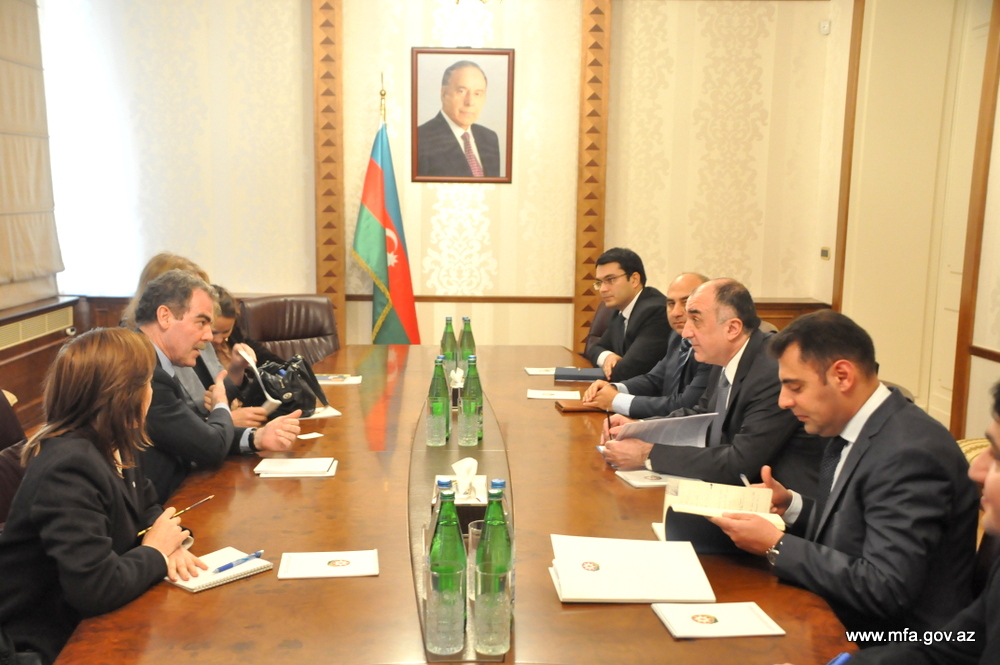Azerbaijan appreciates ICRC's noble work on war prisoners, missing persons

By Aynur Karimova
Cooperation between Azerbaijan and the International Committee of the Red Cross regarding prisoners of war and missing persons were high on the agenda of talks of Azerbaijan's Foreign Minister Elmar Mammadyarov and ICRC's Regional Director for Europe and Central Asia Patrick Vial.
During the meeting, which was held in Baku on October 13, Mammadyarov said that Armenia should demonstrate a constructive position concerning prisoners of war and missing persons, a purely humanitarian issue.
Armenia occupied over 20 percent of Azerbaijan's internationally recognized territory, including Nagorno-Karabakh and seven adjacent regions, after laying territorial claims against its South Caucasus neighbor, causing a brutal war in the early 1990s.
As a result of the military aggression of Armenia, over 20,000 Azerbaijanis were killed, 4,866 were reported missing, almost 100,000 were injured and 50,000 were left disabled.
The minister noted that Armenia's aggression and occupation against Azerbaijan caused more than 4,000 Azerbaijanis to become documented missing persons, most of which were killed and buried in mass graves in Armenia and the occupied territories.
Mammadyarov also stressed that international institutions and the co-chairs of the OSCE Minsk Group should increase efforts to push for the immediate release of Dilgam Asgarov and Shahbaz Guliyev, who were taken hostage by Armenian servicemen while visiting the graves of their ancestors in their historical lands.
The minister went on to add that the increase in cases of civilians shootings by the Armenian Armed Forces is unacceptable, and the incident that occurred on September 1, 2015 when the Armenian military fired at civilians taking part in a wedding ceremony in Terter region's Gapanli village from Azerbaijan's occupied territories is a flagrant violation of international law.
Mammadyarov also touched upon the settlement of Syrians of Armenian origin in Azerbaijan's occupied territories by Armenia, stressing that this is contrary to international humanitarian law, and this issue should be investigated on the basis of the ICRC mandate.
Vial, in turn, expressed pleasure in the cooperation between Azerbaijan and the ICRC, which spans more than 20 years, and appreciated his first trip to the country during his visit to the region.
He also expressed confidence that the agreement reached at the 2014 Paris meeting of Azerbaijani and Armenian Presidents on the exchange of information about missing persons would yield positive results.
Earlier, Vial was received by Azerbaijan's Deputy Prime Minister and the Chairman of the State Committee for Refugee and IDP Affairs, Ali Hasanov. They discussed bilateral relations and the ICRC’s projects along the contact line of Azerbaijani and Armenian troops.
Azerbaijan, a country which has suffered through the last 25 years from the refugee problem, has one of the largest per capita internally displaced persons and refugees burden in the world.
The number of Azerbaijani refugees and IDPs from the occupied by Armenia Nagorno-Karabakh and seven adjacent regions of Azerbaijan is above one million.
Over the years, Azerbaijani government together with international community has provided significant resources towards the improvement of overall living conditions for this group of population.
This has resulted, first of all, in better housing conditions and a significant decline in the poverty rate among the IDPs and refugees.
Despite the enormous efforts made by the government, the total solution of IDP problems is still very difficult to achieve as About 400,000 IDPs continue to live under difficult conditions in old and unsuitable houses.
The full restoration of the human rights of IDPs and refugees requires a resolution of the conflict.
Azerbaijan’s position in this issue is crystal clear: all the internationally recognized territories of Azerbaijan under Armenian occupation must be liberated and the right of IDPs to return to their homes and properties must be ensured. In that regard, the Azerbaijani government has developed a comprehensive repatriation program called the “Great Return” to enable the IDPs to realize their rights to return to their homes and to access to their properties as soon as Armenia withdraw its troops from the occupied Azerbaijani territories.
Long-standing efforts by U.S., Russian and French mediators have been largely fruitless so far. The UN Security Council has passed four resolutions on the Armenian withdrawal from Azerbaijani territories, but they have not been enforced to this day.
--
Aynur Karimova is AzerNews’ staff journalist, follow her on Twitter: @Aynur_Karimova
Follow us on Twitter @AzerNewsAz
